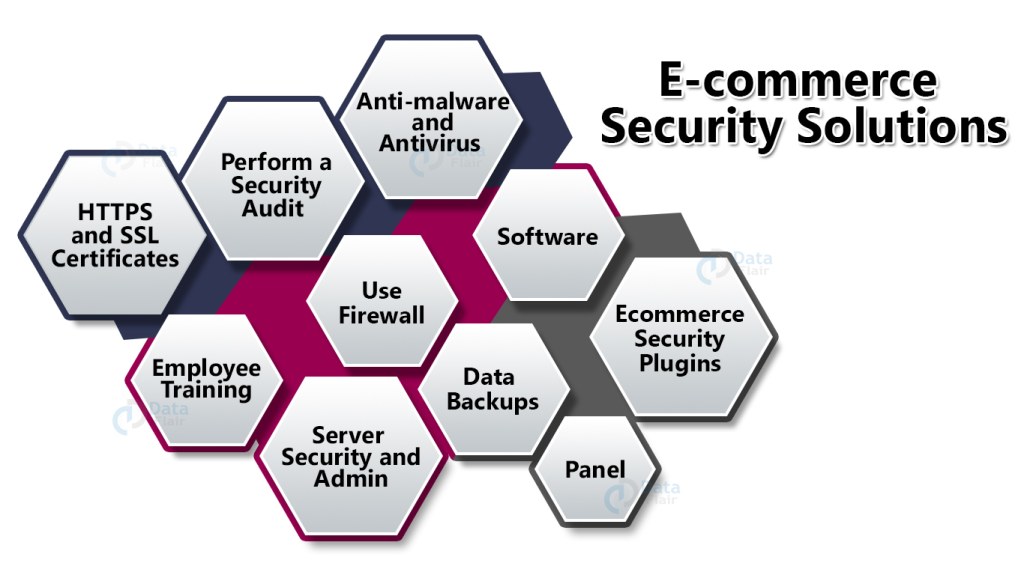Fortify Your E-Commerce With Uncompromised Internet Security: Safeguard Your Online Transactions Now!
Internet Security in E-commerce
Introduction
Dear Readers,
2 Picture Gallery: Fortify Your E-Commerce With Uncompromised Internet Security: Safeguard Your Online Transactions Now!


Welcome to this informative article on internet security in e-commerce. In today’s digital age, online shopping has become increasingly prevalent, making it essential for both businesses and consumers to prioritize internet security. In this article, we will explore the various aspects of internet security in e-commerce and highlight its importance in protecting sensitive information and ensuring a safe online shopping experience.

Image Source: medium.com
Nowadays, people are relying more on e-commerce platforms for their shopping needs. However, this convenience comes with its own set of risks, such as hacking, data breaches, and identity theft. To mitigate these risks, businesses must implement robust internet security measures to protect their customers’ personal and financial information.
In this article, we will delve into the what, who, when, where, why, and how of internet security in e-commerce, providing a comprehensive understanding of this crucial topic.
Table of Contents
1. What is Internet Security in E-commerce?

Image Source:
2. Who is Responsible for Internet Security in E-commerce?
3. When is Internet Security in E-commerce Important?
4. Where Does Internet Security in E-commerce Apply?
5. Why is Internet Security in E-commerce Essential?
6. How Can Internet Security in E-commerce be Achieved?
7. Advantages and Disadvantages of Internet Security in E-commerce
8. Frequently Asked Questions (FAQs)
9. Conclusion
10. Final Remarks
What is Internet Security in E-commerce?
Internet security in e-commerce refers to the protective measures and practices employed to safeguard online transactions, data, and information from unauthorized access, theft, or manipulation. It involves the implementation of robust security systems, encryption techniques, and best practices to ensure the confidentiality, integrity, and availability of online business operations.
Who is Responsible for Internet Security in E-commerce?
The responsibility for internet security in e-commerce lies with multiple parties, including:
1. E-commerce platforms: These platforms must ensure that their websites and systems are secure, regularly updated, and protected from vulnerabilities.
2. Online businesses: Businesses must prioritize the security of their customers’ information by implementing secure payment gateways, SSL certificates, and encryption technologies.
3. Customers: Individuals engaging in e-commerce transactions should also be aware of the risks and take necessary precautions, such as using strong passwords, monitoring their accounts, and practicing safe browsing habits.
4. Government bodies and regulatory authorities: Governments play a vital role in enforcing regulations and standards to protect consumers’ rights and ensure secure e-commerce practices.
5. Cybersecurity professionals: These experts provide guidance, conduct audits, and offer solutions to strengthen internet security in e-commerce.
When is Internet Security in E-commerce Important?
Internet security in e-commerce is crucial at all times, but it becomes even more significant during peak shopping seasons, such as holidays or special promotions. Cybercriminals often take advantage of these periods to carry out attacks and exploit vulnerabilities. Therefore, businesses and customers must remain vigilant and prioritize security measures during these times.
Where Does Internet Security in E-commerce Apply?
Internet security in e-commerce applies to various aspects of online transactions, including:
1. Payment processing: Securing payment gateways and ensuring the confidentiality of customers’ payment details.
2. Personal information: Protecting customers’ personal data, such as names, addresses, and contact information, from unauthorized access or misuse.
3. Online shopping platforms: Ensuring the security of e-commerce websites, including secure login processes, protection against hacking attempts, and preventing data breaches.
4. Supply chain management: Securing the flow of information and data throughout the supply chain to prevent tampering, counterfeiting, or unauthorized access.
5. Customer trust and reputation: Implementing robust security measures to maintain customers’ trust and protect the reputation of e-commerce businesses.
Why is Internet Security in E-commerce Essential?
The importance of internet security in e-commerce cannot be overstated. Here are some key reasons:
1. Protection of sensitive information: Internet security measures ensure the safeguarding of customers’ personal data, credit card details, and other sensitive information from falling into the wrong hands.
2. Prevention of financial losses: Strong security measures significantly reduce the risk of fraud, hacking, and identity theft, minimizing financial losses for both businesses and consumers.
3. Trust and reputation: When customers feel secure while shopping online, they are more likely to trust the e-commerce platform or business, leading to repeat purchases and positive recommendations.
4. Compliance with regulations: Businesses must comply with data protection laws and regulations to avoid legal consequences and penalties.
5. Sustainable growth: Robust internet security practices allow businesses to grow sustainably, expand their customer base, and establish long-term relationships with their customers.
How Can Internet Security in E-commerce be Achieved?
Achieving internet security in e-commerce requires the implementation of various measures, including:
1. Secure website development: E-commerce platforms and businesses must follow secure coding practices and regularly update their websites to protect against vulnerabilities.
2. Encryption technologies: Implementing SSL certificates and encryption algorithms to secure online transactions and protect sensitive information.
3. Secure payment gateways: Utilizing trusted and secure payment gateways that comply with industry standards and regulations.
4. Two-factor authentication: Requiring customers to provide an additional layer of verification, such as a One-Time Password (OTP), to enhance security during login or transaction processes.
5. Regular security audits: Conducting frequent audits and vulnerability assessments to identify and address any potential security weaknesses.
6. Employee training: Providing comprehensive training on internet security best practices to employees to ensure they are aware of potential threats and can effectively respond to them.
7. Collaboration with cybersecurity experts: Seeking professional assistance from cybersecurity experts to assess and enhance the security posture of e-commerce systems.
Advantages and Disadvantages of Internet Security in E-commerce
Advantages:
1. Enhanced customer trust: Robust internet security measures build trust and confidence among customers, encouraging them to shop online without hesitation.
2. Reduced fraud and financial losses: Strong security measures minimize the risk of fraudulent activities, protecting both businesses and consumers from financial losses.
3. Long-term customer relationships: When customers feel secure and protected, they are more likely to establish long-term relationships with e-commerce businesses, leading to repeat purchases.
Disadvantages:
1. Implementation costs: Implementing comprehensive internet security measures may require significant investments in technology, infrastructure, and employee training.
2. User experience impact: Some security measures, such as additional verification steps, may slightly increase the complexity and time required to complete transactions, potentially affecting the user experience.
3. Constantly evolving threats: Internet security threats are continuously evolving, requiring businesses to stay updated and adapt their security measures accordingly.
Frequently Asked Questions (FAQs)
1. Is online shopping safe?
Yes, online shopping can be safe if proper internet security measures are in place. Always shop from trusted websites and ensure the website has secure payment gateways.
2. How can I protect my personal information while shopping online?
To protect your personal information, use strong, unique passwords, keep your devices and software updated, and avoid sharing sensitive information over unsecured networks.
3. What is the role of encryption in e-commerce?
Encryption ensures that data transmitted between your device and the e-commerce website is secure and cannot be intercepted or tampered with by unauthorized individuals.
4. Are mobile shopping apps secure?
Mobile shopping apps can be secure if they follow proper security protocols, such as encryption and secure payment gateways. Stick to reputable apps from trusted sources.
5. What should I do if I suspect my credit card information has been compromised?
If you suspect your credit card information has been compromised, immediately contact your bank, report the incident, and follow their instructions to protect your account and mitigate any potential damages.
Conclusion
In conclusion, internet security in e-commerce plays a crucial role in protecting sensitive information, preventing financial losses, and maintaining customer trust. E-commerce platforms, businesses, and customers must all contribute to ensuring a safe and secure online shopping experience. By implementing robust security measures, adhering to best practices, and staying vigilant against evolving threats, we can collectively create a secure e-commerce ecosystem.
Final Remarks
Dear Readers,
Internet security in e-commerce is a constantly evolving field, and it requires continuous efforts to stay ahead of cyber threats. By staying informed, implementing best practices, and prioritizing secure online transactions, we can all contribute to a safer and more reliable e-commerce landscape. Remember, your security is in your hands, so always practice safe online shopping habits and protect your sensitive information.
Thank you for reading,
[Your Name]
This post topic: Technology Tutorials


